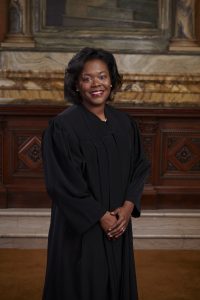Subscriber Benefit
As a subscriber you can listen to articles at work, in the car, or while you work out. Subscribe NowHaving built a legal career that includes two federal court clerkships, 12 years in the U.S. Attorney’s Office for the Southern District of Indiana and four years as a federal magistrate judge, 7th Circuit Court of Appeals nominee and Southern Indiana District Court Magistrate Judge Doris Pryor sat for her confirmation hearing Wednesday and faced the stiffest questions about a 2019 speech she gave for Constitution Day at her son’s elementary school.
The inquiry came from Senate Judiciary Committee member Sen. Mike Lee, R-Utah, and focused on her description of the Constitution as a “living document.” Pryor calmly deflected the attempt to draw her into a debate about constitutional interpretation and, afterward, Sen. Amy Klobuchar, D-Minnesota, told Pryor she handled herself well.
“I was first paralyzed at the thought that you go and talk at your kid’s Constitution Day and it shows up at a Senate Judiciary hearing,” Klobuchar chuckled.

Pryor and 9th Circuit Court of Appeals nominee Roopali Desai were on the first panel that appeared before the Judiciary Committee. Republicans directed most of their questions to Desai, asking her about religious freedom, ballot harvesting, school choice and her ability to be an impartial judge.
Sen. Todd Young, R-Indiana, who immediately supported Pryor when her nomination was announced, introduced her to the Judiciary Committee.
“As you can tell, she has experience on all sides of the courtroom,” Young told the committee members. “She understands the difference between the role of an advocate and the role of a judge and she has experience on both the criminal side and on the civil side of the docket. Since her name came up, I’ve heard an outpouring of support from across the Indiana legal community … .”
Pryor used her opening remarks to acknowledge both Hoosier senators. She thanked Young for “those warm introductions” and Sen. Mike Braun, also a Republican, for his “unwavering support.”
Speaking after the hearing, Carl Tobias, a University of Richmond School of Law professor who studies the federal judicial selection process, said he is confident Pryor will be confirmed to the federal appellate bench. Because both Indiana senators are in favor of her nomination, she has the votes she needs, he said.
“How can you not like her?” Tobias asked. “She was very personable, straight-forward, articulate, clear, candid, comprehensive, plus she had her lines down. She was great. I thought she was very impressive.”
As for Lee’s line of questioning, Tobias characterized it as the senator getting “pretty desperate” to find something controversial.
“You could see that she was an experienced litigator,” Tobias said. “She wasn’t going to be run around by those folks.”
Both Sen. Lee and Pryor were polite and respectful of each other and neither lost their composure during the back-and-forth about her Constitution Day remarks.
Lee asked, “During the speech, you said that the Constitution’s words ‘permit us to live out the true meaning of its doctrine and interpret it as a living document.’ Can you tell me what, what you mean when you say we should interpret the Constitution is a living document?”
Pryor replied, “I truly believe that the Constitution is a living document and what’s so unique, or in its genius, is … that the forefathers saw its ability and its need, if necessary, to be changed. … What’s important about it is that the framers saw the need to be able to have this constitution be able to apply to circumstances that they might not have thought of, searching a cellphone or a wiretap.”
Lee countered, “Does that mean the Constitution’s meaning changes over time?”
Pryor responded by citing her role on the court.
“As a judicial officer, I am guided by both, as well as the binding precedent of the Supreme Court and the 7th Circuit,” Pyror said. “And so when looking at constitutional issues, I am guided by those opinions in making that determination.”
Lee further asked, “When you say, ‘It’s a living document,’ does that mean that the meaning itself changes or does that mean that the meaning established and embraced, codified within the Constitution at the time it was written can be applied to other circumstances not foreseen? You refer to search and seizure principles, for example.”
Pryor reiterated she would be bound by precedent.
“Again, I would be directed by Supreme Court direction on that question,” she said.
Pryor’s husband and her son sat behind her at the hearing along with her parents and grandmother, after whom she was named.
Sen. Cory Booker, D-New Jersey, told Pryor he was going to tell his mom about her.
“She will celebrate with me,” Booker said to Pryor. “This awe that we have that women like you are now coming on to the judiciary at a level that we have never before seen in America. This president has put more African American women on the circuit court than every other president before him combined.”
Tobias said expects the committee will vote on Pryor’s nomination Aug. 4, and the Senate could confirm her in September. If she is elevated, Pryor will be the first African American woman from Indiana to sit on the 7th Circuit.
Please enable JavaScript to view this content.
